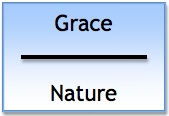
or

The dualism was created between "upper" and "lower" stories, and the "lower" was given autonomy. Schaeffer says, "Whenever you make such a dualism and begin to set up one autonomous section below, the result is that the lower consumes the upper... If you try artificially to keep the two areas separate and keep the autonomous in one are only, soon the autonomous will embrace the other."
We have seen this in art, moving from the 13th century's heavenly symbolic paintings (they tended to paint Mary and Jesus in symbols greater than the rest of nature, if they painted nature at all), to a more balanced view of it all when they started painted realistic paintings of Mary and Jesus with real balance between them and nature in realistic depth and perception. From here they moved to painting Mary very realistically, but using the kings' mistresses to portray Mary with even breasts exposed.
The next step was to move away totally from painting any heavenly concepts to doing art that only shows nature or humans without reference to the "upper story." This started including nudity and later pornography. What was the final step? Due to their autonomy in the "lower story" and the victory of the "lower story," man has lost meaning and significance and his ability to communicate the reality of life. Although their presuppositions tell them that there is only a "lower story," life shows them that there is more at a higher level. This inability to unite their "lower story" with what they know should be an "upper story," caused them to lose their communication at that level, and this brought in the idea of abstract art. This shows a total move from the heavenly and man as significant with meaning created in God's image to the absolute meaninglessness of man in his own despair.

or

Another area where I believe there is such an autonomy being set up, is in the area of politics and government. There has been such a drive in the US and elsewhere to separate "church and state" that it seems to me that this drive of the state for its own autonomy will soon lead to the church being swallowed up.

to

David Noebel, Ph.D writes in his 'Understanding the Times':
"Many people believe that when Christians confront other worldviews and attempt to speak to such 'worldly' disciplines as politics, economics, biology, and law, they are overstepping their bounds. 'Mind your own business,' we are told. Jesus taught His followers, 'you do not belong to the world, but I have chosen you out of the world' (John 15:19).
How, then, can the Christian justify his claim to a worldview that speaks to every facet of life? Shouldn’t he stick to spiritual matters and allow non-Christians to concentrate on the practical matters of running the world?
In short, isn’t there a difference between the secular and the sacred?
Not according to Dietrich Bonhoeffer, who says we should not distinguish between the two: 'There are not two realities, but only one reality, and that is the reality of God, which has become manifest in Christ in the reality of the world.'"Let us put this another way. Christians have come to the point where they have almost nothing to say unless it has a direct bearing on spiritual things removed from the natural. "Ask me how to get saved, and I will tell you!" Many Christians have divorced themselves from thinking, and dwell for the most part on existential notions. What I mean by this is that while theologically speaking Christians have moved away from liberal and existential theology, they have nonetheless moved toward practicing their Christianity in existentialistic ways. Existentialism has a leap of faith to get from the "lower story" to the "upper story" and many Christians today think that this concept of the "leap of faith" is very spiritual and Biblical. However, the Bible never asserted that we need a "leap of faith" in order to meet with God. Existentialism held on to the liberal notion that we are not sure which parts of the Bible are true and which not, but made that "leap of faith" anyhow to get to the "upper story" which they are not sure whether it exists or not. Many modern Christians try to keep on to the historic faith theologically, but when it comes to reaching the world, they expect non-believers to make that leap of faith without any backup for what they believe. God is the God of all life, not just the spiritual, but people have lost the idea of God, and in fact have lost the meaning of the word "god." Today, "god" can be anything from self to the trees to a thought. Thinking has diversified and a pluralism has set in that Christians find difficult to deal with. Christian culture is not a thinking culture anymore, because for so long we did not have to defend our way of life and the morals we hold to. So, while the world moved on to a post-modern society with its plurality of thought and beliefs, the church has remained behind in its way of thinking and reaching out to the world. Whereas 50 years ago it would have been enough to tell people to repent and believe in Jesus, today they do not see the need for repentance at all. The world has no idea about god, nor any reason for salvation, and yet we are telling them to accept Jesus. On what authority must they accept Christ.
http://www.homebasededucation.com/worldview/noebel-chp2.asp
We need to become apologists to our own generation and speak to them at their own level. We need to start speaking to people not as objects of evangelism, but to people with significance. We need to approach them with real love and concern, and that means listening to their questions and answering them at their level. Glib answers will not do anymore. We need to show them that true truth can only be found in Christianity, but with answers that has real depth and meaning. "Just believe" does not work anymore. True truth is at the bottom of it all. Schaeffer says:
"If we do not communicate clearly on the basis of antithesis [believing A is A and not non-A], many will respond to their own interpretation of the gospel, in their own relativistic thought-forms, including a concept of psychological guilt-feelings rather than of true moral guilt before the holy, living God." (p.195 ff).He continues to say that if this is the way they respond to the gospel they do not understand the gospel, and therefore is still lost. Due to the plurality of the modern culture and its views of a boiling pot of whatever-gets-your-fancy attitude, your evangelism will be understood in the 20th century thought form of synthesis (all rivers flow into one). The proper understanding of the importance of truth and its practice, even when it becomes costly, is of utmost importance if we want our witness to bear fruit. If Christian truth is going to stand in the view of the world, then we need to stand on the full truth of the Scriptures, and practice that truth in holding to the doctrines that are so dear to us. This means that there will be times when we will have to separate ourselves from those who seem to be Christian, but do not hold to the complete doctrinal truth as revealed in the Bible. It is said that we should cooperate out of love with those "Christian" groups that we differ with. If this means we have to compromise the truth of the Scriptures then we should not cooperate. This is where our stand on truth will mean nothing to the world. Again, Schaeffer says:
"In an age of relativity, the 'practice' of truth when it is costly is the only way to cause the world to take seriously our protestations concerning truth. Cooperation and unity that do not lead to purity of life and purity of doctrine are just as faulty and incomplete as an orthodoxy which does not lead to a concern for, and a reaching out towards, those who are lost." (p197)Thus, we should become thinking Christians. Christians that can sit with the world in the marketplace of ideas, and convince them of the truth of Christianity. Remember, unlike the salvation claims of the world thought-forms and other religions, Christianity is based in history. We need no "leap of faith" to believe the claims of Christianity. We need only to look at history and the many proofs of the reality of Christianity to know that its claims are true. Christianity is not a mysticism outside of reality, but a relationship with One who was born, educated, lived, died, and raised from the dead in real-time history. The claims of Christianity are based on fact in history, not on mystical, existential "leaps of faith" into an unknown darkness that we are not even sure exists.
Just thinking...

No comments:
Post a Comment